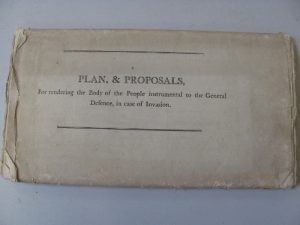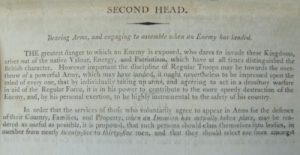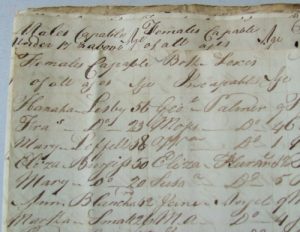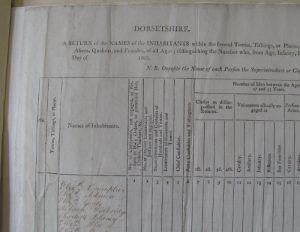As a coastal town, Poole has always been vulnerable to attack by sea – from the Roman invasion, through the burning of the town by the Spanish in 1405, right up to the Second World War.
‘All my thoughts are directed towards England’
In the early months of the Napoleonic Wars (1803-1815), the whole country was on high alert. Napoleon’s forces were massing in France, with a flotilla of gunboats and barges poised for an assault on England. The looming threat of French invasion was particularly acute along the south coast. Records in the Poole Borough Archive illustrate the nation and town’s preparations for war.
The collection includes general war plans, ‘A plan and proposals for rendering the body of the people instrumental to the general defence, in case of invasion: Dorsetshire’, providing various counter-invasion strategies. Forms were provided to record supplies, force of arms, the names of skilled individuals and other resources, including numbers of livestock, waggons, millers, bakers and boat owners and individuals aged 15-60 years willing to bear arms or act as pioneers, labourers or guides.
Men were pressed into service or encouraged to become ‘Sea Fencibles’ or join the voluntary infantry. Parade roll calls, attendance and enrolment lists in the Borough collection provide the names of a number of these men, including those of the 3rd Company Dorset (Poole) Voluntary Infantry.
Census of the ‘capable’
The intention to involve the entire population in the country’s defence is striking. In Poole, a census was taken of men, women and children, with each individual classified in terms of their ability to contribute to the war effort. Although not including males of military age, the census provides sections for ‘female capables’, ‘both sexes incapable’ and ‘male capables aged under 17 and above 55’. Numerous additional ‘Returns’ of inhabitants were put together, some listing men serving or willing to serve in the army or militia, others listing men and women by name and recording the number of weapons and implements in their possession (including pikes, pitchforks, shovels, saws, swords and pistols).
Fortunately, despite costly and lengthy preparations, Napoleon abandoned plans for the invasion of England in 1805. The records survive as a fascinating insight into what might have been.
The papers relating to the Napoleonic invasion threat [reference: DC-PL/I/3] have been catalogued as part of the Borough of Poole archive project. These papers, along with hundreds of other recently catalogued records, are available to view at Dorset History Centre.






Dear Sir/Madam
I am presently undertaking a family history research into my maternal line (surname HANCOCK). My ancestral family had settled and were well established in East Kent. I am currently investigating a particular member of my ancestral family – a George Hancock (1764-1821) – who lived in the village of EASTRY, a few miles inland from the medieval Cinque port of Sandwich, Kent. It seems George was something of a village ‘elder’ within Eastry and, at the height of the Napoleonic Wars when there was a genuine fear of invasion, George was involved in participating in strategy called, I believe, ‘Dead Stock’. I understand that this was a campaign which was intended to frustrate, harass and hinder any invading army by organizing an evacuation of the local population, destroying crops, livestock and shelter which might give succor to an invasion force. Beyond these few scant details , I have very little further information. But the notion of an organized resistance of this nature does seem very plausible! I am presently making enquiries locally. Indeed, a fellow member of the Kent Family History Society kindly supplied this link. I would be most grateful to discover if anyone has heard of this concept of ‘Dead Stock’ and perhaps offer any further information on the subject.
Hi Peter, thank-you for your comment. The “Proceedings of the Dorset Natural History and Archaeological Society” are the most useful source we are able to find on this concept. In Volume 90 (1968), pp.303-312, Brigadier R. Chenevix-Trench penned an article titled “Dorset Under Arms in 1803” which talks at some length about the command of the Lord Lieutenant of Dorset and Poole, and his response to the 1803 Act of Parliament which put the country on defence. In this article are the following paragraphs:
“Under the first head Driving the Country, the importance is emphasised of ‘the immediate removal of horses and draught cattle, the former of which would be useful in mounting the Enemy’s Cavalry, the latter in dragging his Artillery, Ammunition, Stores etc”. Here Indemnification is again promised for property that must be left behind.
The order of importance for the removal of stock is given as:- first, horses and wagons carrying those who cannot remove themselves unaided: secondly, cattle: thirdly, sheep and all other livestock. Every parish is advised to select ‘discreet trusty persons’ to stay behind until the enemy actually arrives: until then their task will include making contact with the army and getting receipts for anything that the army takes over. Overseers are to be selected by the magistrates and charged with the removal and march of stock to the selected rendezvous.”
It may well have been that your George Hancock was considered a ‘discreet trusty person’ at that time!